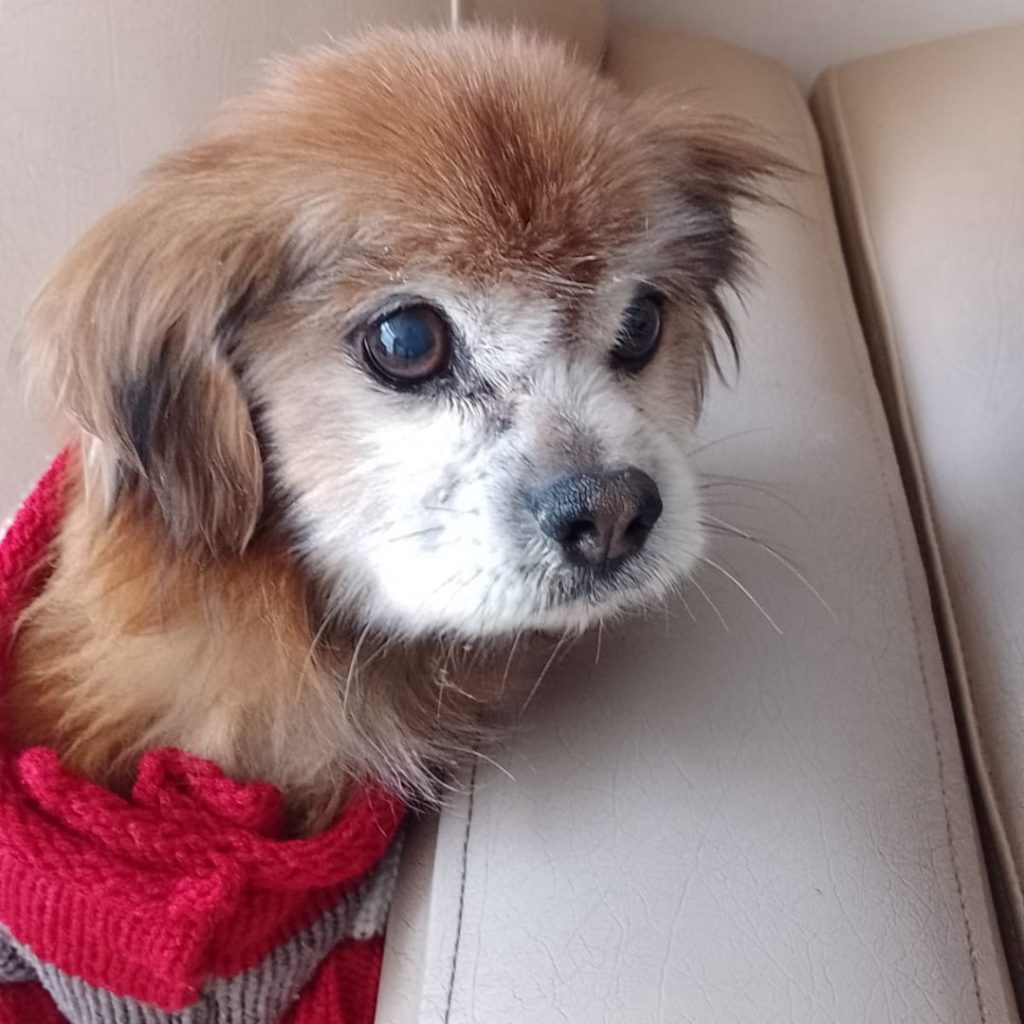
Did you know that senior pets represent 44% of the pet population? 🤯 I know, right? Our beloved furry companions are aging, and their life span is increasing. But, as they grow older, their needs change and we must make adjustments. In this article, we will review all essential topics to enhance your senior dog’s well-being, comfort, and quality of life.
Common Health Issues in Senior Dogs
Our dogs will experience various physical and mental changes as they age. We must be familiarized with these conditions to accommodate their needs. Some of the most common health issues include:
- Cognitive decline leads to confusion, anxiety, changes in sleep patterns, disorientation, and forgetting potty training.
- Joint pain and loss of mobility
- Dental problems such as periodontal disease and tooth decay, can lead to pain, difficulty eating, and other health issues.
- Weight changes.
- Vision and hearing loss.
- Urinary and Bowel Control.
Read more: 11 Common Health Problems in Senior Dogs
Essential Care Items for Your Senior Dog
As a pet sitter, I always recommend to my customers to include these items as part of their dog’s care essentials:
- An orthopedic bed to relieve pressure on their joints.
- Specialized food and supplements tailored to their health needs.
- Mobility aids such as ramps or stairs to help them access elevated surfaces, harnesses or slings to support their hind end, elevated water and food bowls, and non-slip mats or booties to provide traction on slippery floors.
- Any interactive toys and puzzles to keep their minds sharp and prevent cognitive decline.
- Grooming supplies like brushes, combs, nail clippers, and dog-friendly shampoos.
- Dental care items such as toothbrushes and dental chews.
- Medical records, vet numbers, and emergency numbers.
- Comforting items such as blankets, plush toys, or a piece of clothing with your scent on it. These provide a sense of familiarity and comfort when they are feeling anxious.
Creating a Comfortable Environment
Home is where our doggies spend most of their time that’s why is important that they feel comfortable and safe there.
- Provide a cozy sleeping area with soft and clean bedding, easily accessible and in a quiet place.
- Keep the temperature of the environment comfortable as they are more sensitive to temperature changes. Provide blankets or a heating bed during the colder months and shade and fresh water for warmer weather.
- Make your home safe and remove any potential hazards.
- Prevent falls by using slip-proof mats or rugs on smooth surfaces.
- Avoid exposing your dog to loud environments as this can trigger anxiety.
- Ensure they are receiving enough daylight by moving their bed to a bright room in the mornings. Move the bed back to a darker room or close the curtains at night.
- Encourage your senior dog to use a designated space whenever they need some solitude or relaxation.
Tailoring Diet and Nutrition for Senior Dogs
Before making any changes to your senior dog’s diet, consult with your veterinarian.
- Opt for high-quality senior dog food that contains lean proteins, easily digestible carbohydrates, and essential fatty acids.
- Follow your veterinarian’s guidance on appropriate portion sizes to ensure your senior dog maintains a healthy weight.
- Ensure fresh, clean water is readily available to them at all times.
- Discuss with your veterinarian the inclusion of joint health supplements in your senior dog’s diet. Glucosamine, chondroitin, and omega-3 fatty acids can help support joint health, reduce inflammation, and alleviate symptoms of arthritis.
- If your senior dog has dental issues or difficulty chewing, consider moistening their dry food with warm water or switching to wet food.
- Keep a close eye on your senior dog’s weight, appetite, and overall condition.
Read more: Optimal Senior Dog Food: Nutrition for Healthy Aging
Exercise and Mental Stimulation for Aging Canines
- Low-impact exercises such as short walks, swimming, and slow-paced games of fetch will keep them active without overworking their joints and muscles.
- Try puzzles, interactive feeders, and treat-dispensing toys to keep them mentally stimulated.
- Rotate their toys regularly to keep them engaged and interested.
- Hide treats or toys around the house or create a scent trail for them to follow. This stimulates their mind and taps into their innate abilities.
- Arrange playdates with well-matched dogs to ensure socialization.
- Teach them new tricks that are suitable for their age and physical abilities. Use positive reinforcement and reward their efforts.
Read more: Brain Training for Dogs by Adrienne Farricelli: Full Review
Grooming and Hygiene for Aging Pooches
- Brush your dog’s coat regularly using a soft-bristle brush or a grooming mitt suitable for their coat type. This helps remove loose fur and prevent matting. Regular brushing also provides an opportunity for you to check for any skin abnormalities or lumps.
- Brush your dog’s teeth regularly using a toothbrush and toothpaste formulated specifically for dogs. Additionally, consider dental treats or toys that help reduce plaque buildup.
- Make sure to clean your dog’s ear regularly. Wrap a piece of toilet paper in your finger or use a soft cloth to clean the outer part of the ear and gently remove any dirt. Avoid inserting anything deep into the ear canal to prevent injury.
- Keep your dog’s nails trimmed to a comfortable length to avoid discomfort or joint issues. Use a dog’s nail clipper and be cautious not to cut into the quick. Alternatively, seek professional assistance from a groomer.
- Clean your dog’s eyes with a damp cloth in the mornings and keep their bedding items clean to prevent eye infections.
- Bathe your dog as needed, but avoid excessive bathing because it can cause skin problems. If your dog has difficulty standing for extended periods, consider using a non-slip mat or a specially designed bathing aid to ensure their safety.
- Some senior dogs may require regular anal gland expression to prevent discomfort. Signs of anal gland issues may include scooting, excessive licking, or foul-smelling discharge. Seek help from a professional groomer for advice on the frequency.
- Monitor your senior dog’s skin for any signs of dryness, flakiness, or irritation.
- Monitor their bathroom habits closely and consult your veterinarian if you notice any changes or accidents. Provide regular bathroom breaks and consider using puppy pads or diapers if needed.
Read more: How to Bathe a Senior Dog: Tips for a Comfortable Experience
How to Respond in an Emergency
- Stay calm and assess the situation.
- Contact your veterinarian or emergency clinic and follow their guidelines.
- In case of bleeding, apply gentle pressure to the wound using a clean cloth. If the bleeding doesn’t stop after a few minutes take them to the vet.
- If your dog is experiencing heatstroke, move them to a shaded and cool area, provide fresh water, and place a wet towel with cold water on their body.
- During a seizure, ensure your senior dog’s safety by removing any nearby objects that could cause harm. Do not attempt to restrain them. Keep track of the seizure duration and contact your veterinarian afterward for further guidance.
- If you suspect a fracture or broken bone, minimize movement and transport your senior dog to the veterinarian.
- Prepare a well-stocked first aid kit, including items such as bandages, gauze, adhesive tape, antiseptic solution, a rectal thermometer, and a list of emergency contacts.
- Take your dog to the vet immediately if they are choking, having difficulty breathing, suspect your senior dog has ingested a toxic substance, has severe bleeding, or animal bite.
Final Thoughts
We hope this guide provides you with valuable information to ensure that your dog’s senior years are filled with comfort, happiness, and quality of life. Be aware of their physical and mental changes as they age and adapt to meet their needs. Be patient, loving, caring, and understanding.
Most importantly, cherish every little moment, create new memories, and appreciate the bond you have created with your pup.
Recent Articles:
- Amazon’s Top Black Friday and Cyber Monday Deals for 2024: Dog Products Edition
- Top Pet Trackers for Sending Your Dog with a Pet Sitter
- Should Dogs Wear Bells?
- Which Dog Breed Has the Longest Lifespan?
- What Your Dog’s Poop Reveals (Healthy Poops and Warning Signs)
Recent Posts
Amazon's Top Black Friday and Cyber Monday Deals for 2024: Dog Products Edition
The holiday shopping season has officially started and Amazon has already released some incredible deals on pet products for Black Friday and Cyber Monday 2024. Here is our curated list of the...
As someone who boards dogs as a side gig, I am used to seeing many pet trackers and smart collars these days. These devices have become a must-have tool for pet owners (especially when trusting their...
